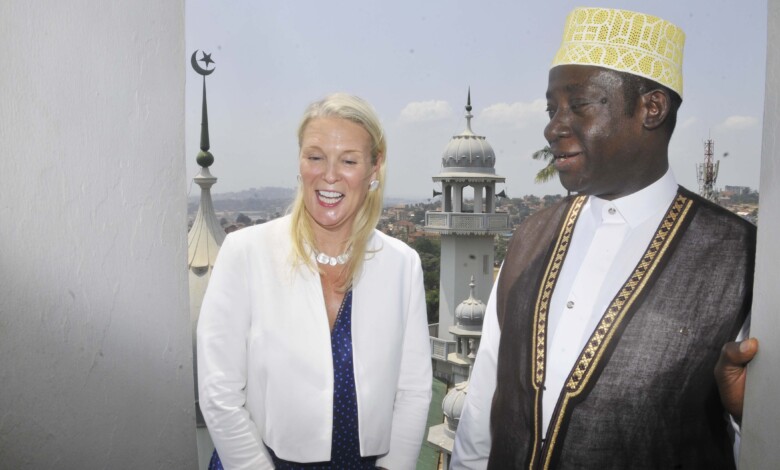UK Envoy hails Uganda’s interfaith harmony

By Abdul-Wahid Kakande
The Kibuli Muslim community was filled with joy as the British High Commissioner to Uganda Lisa Chesney toured the grand mosque on Tuesday.
Lisa had paid a courtesy call on Prince Kassim Nakibinge Kakungulu, the titular head of the Muslim community in Uganda when she toured the mosque. It was Prince Nakibinge that led her on the guided tour of the historical Kibuli mosque.
Officially opened in 1951, the Kibuli mosque holds historical and religious significance for the Muslim community in Uganda.
Speaking to the media, Lisa saluted Uganda on religious tolerance, saying it is one of the many things that have impressed her in Uganda.
“His Majesty the King is a strong supporter of inter faith activities and religious tolerance. One of the things that impresses me here in Uganda is religious tolerance,” Lisa said.
Without giving the details, Lisa said they discussed with Nakibinge a number of topics including unity and development. She thanked Nakibinge for the warm welcome.
Explaining the purpose of the visit, Nakibinge said it was basically about strengthening the ties and cooperation between the British people and Ugandans in general particularly Buganda kingdom and the Muslim community.
“Our discussion was centered on what brings us together as opposed to what divides us. We have looked at having respect for each other’s values and also how to encourage our people to uphold religious tolerance,” Nakibinge said.
Nakibinge said they also discussed ways and means of further improving inter-cultural understanding in addition to the available business opportunities.
“This visit was basically about further strengthening the ties and cooperation between the British people and Ugandans in general particularly Buganda kingdom and the Muslim community,” Nakibinge said.
Nakibinge said Ugandans only need to improve on the standard of products because the British market has been made available to them.
“I have engaged her on the business opportunities available to our people and she said we only need to improve on the standard of our products,” Nakibinge revealed.
Nakibinge commended the British government for the support that it has offered to Uganda over the years.
“We want to thank the British government more sincerely for the cooperation and assistance you have given to our people and for having taken time to visit us. This is something we would like to grow in leaps and bounds,” Nakibinge said.







